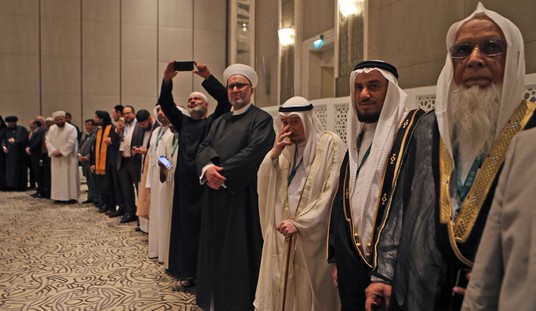Last month, the Obama administration’s decision to dismiss a default judgment against the New Black Panther Party in a clear case of voter intimidation (caught on videotape and circulated on the internet) drew scrutiny from Congress and from the U.S. Civil Rights Commission. That scrutiny has now resulted in one announced investigation by the Justice Department’s Office of Professional Responsibility (OPR) and set the stage for a battle between the administration and the Commission.
In June, the Commission sent a letter of inquiry to the Justice Department demanding an explanation for the dismissal of the case against all but one defendant. In August, the Commission sent a second letter directly to Attorney General Eric Holder reiterating its demand for information on the reasons for the dismissal and advising Holder of its intention to use the Commission’s statutory authority to subpoena witnesses and documents. It also renewed its demand for records of past DOJ investigations so it could make an independent determination as to whether the New Black Panther case’s dismissal was an abrupt change in Justice Department policy, and if so, what the impact of that policy change might be on future acts of voter intimidation. However, the “most transparent administration” in history (it tells us) did not even acknowledge receipt of the letter for weeks.
Last week, the Commission’s General Counsel contacted the Justice Department to inquire if a response would be forthcoming and to advise the Justice Department that on Friday the Commission would meet to decide an issue left open at its meeting last month, namely whether to designate its already expanding investigation into the New Black Panther case as an issue for a year-long study and special report. (By statute the Commission must complete at least one such study and report each year on a matter of federal civil rights enforcement.) Later that day the Justice Department sent a one paragraph letter to the Commission advising that an OPR investigation would be opened and “accordingly” no answer would be forthcoming until OPR concluded its investigation.
A source familiar with the Commission’s deliberations tells Pajamas Media that a number of the commissioners were aghast by the response. An OPR investigation is, of course, no basis for declining to co-operate with the Commission in its statutorily authorized obligation to investigate enforcement of civil rights laws. Moreover, during the Bush administration many controversial issues were the subject of investigation and litigation on multiple “tracks” (e.g., the firing of nine U.S. attorneys triggered both congressional inquiries and an inspector general’s report, investigations of embattled former Voting Rights Section chief Jack Tanner were conducted by both Congress and OPR).
Moreover, the Commission’s concerns, including whether the dismissal marks a deviation from past policy and whether the underlying case did concern a serious civil rights violation, are beyond the ordinary purview of OPR. OPR, in contrast to the Commission, will examine the narrower issue of whether politics or other improper considerations played any role in overriding the decision of the career attorneys who opposed the dismissal.
As one Commissioner described it, the DOJ’s excuse would be analogous to a corporation charged with employment discrimination which instituted an internal investigation — and then claimed that a civil lawsuit couldn’t proceed until the corporation investigated itself.
The analogy is on target here given the fact that OPR is not an autonomous organization but reports up through the Justice Department chain of command to the attorney general. If in fact politics intervened at the behest or with the knowledge of the attorney general or his direct subordinates, then there is all the more reason for an independent entity such as the Commission to examine what occurred.
The commissioners met on Friday to debate the issue. Commissioner Todd Gaziano pointed out that the Commission’s independent examination of the fact witnesses and former defendants in Philadelphia as well as its request for the Department’s records of previous investigations could not possibly conflict with DOJ’s internal investigation of the New Black Panther case. Nevertheless, he acknowledged some potential concerns that might later arise with aspects of the Commission’s investigation and the Justice Department’s OPR investigation, and he offered that the Commission would be sensitive to the OPR interest in rooting out evidence of ethical misconduct by the Justice Department.
“We made it clear we would be willing to consider accommodations regarding specific discovery requests, both as to timing and potentially as to content,” he told me. “But the Department first needs to acknowledge our statutory right to investigate this enforcement matter and begin to fully cooperate as the law plainly requires.” Other commissioners expressed the same sensitivity to potential conflicts with the DOJ but also indicated that they doubted that any real conflicts would arise between the Commission’s investigation and an internal OPR probe.
A proposal to designate the matter as one for a year-long study summarized the significance of the investigation and why the Justice Department must cooperate with the Commission. The proposal explained:
The dismissal of the federal government’s suit against most of the New Black Panther Party (NBPP) defendants, and the narrow injunction against the remaining defendant — who stood outside a Philadelphia polling place, wearing a paramilitary uniform, brandishing a nightstick, and peppering certain voters with racially-offensive comments as they approached the polls — has the potential to significantly change the understanding some officials have regarding the coverage and enforcement of § 11(b). The USCCR voted on August 7 to expand its inquiry into DOJ’s actions and rationale in that case. As is set forth in the Commission’s August 10 letter to Attorney General Holder, it is important to determine whether the Department has changed its interpretation of § 11(b) (which will require an examination of prior investigations), and if so, what effect that change is likely to have on its enforcement policy. In turn, we should determine whether the policy change might increase intimidating conduct, whether we believe that conduct violates the VRA [Voting Rights Act] or not.
An examination of DOJ’s enforcement of § 11(b) should determine the facts in the NBPP case to place it within the proper context of prior enforcement actions and policies. The Commission should then attempt to determine: (1) whether the rule of the NBPP case (whether it amounts to a new policy or not) would have led to different results in prior cases, and (2) whether it would render current examples of alleged intimidation outside the coverage of the VRA.
The proposal then sketched out a plan for investigation including a possible onsite hearing in Philadelphia to determine the underlying facts of the dismissed case. The plan also called for questioning of key Justice Department figures:
- Thomas J. Perrelli, Associate Attorney General
- Loretta King, Acting Assistant Attorney General for Civil Rights
- Diana K. Flynn, Appellate Section Chief, Civil Division
- Christopher Coates, Voting Rights Section Chief, Civil Rights Division
Perrelli, the number three man in Justice, was involved (according to the Washington Times) in the decision to dismiss the default judgment, despite prior repeated denials by the Justice Department that only career attorneys had made the call. King, as reported here and in the Weekly Standard, was the official who directly ordered the dismissal. Flynn’s group recommended that the case not be dismissed but was overridden. Coates, it is believed, was opposed to the dismissal as well and supported his career attorneys who filed the case.
The Commission on Friday voted unanimously by a 5-0 margin to pursue the year-long study and to set up a separate subcommittee to handle sensitive discovery issues. The Commission also agreed to send a letter replying to the Justice Department’s announced refusal to cooperate with the Commission’s investigation.
It seems that we are therefore headed for a clash between the administration, which has bragged about its transparency, and the Commission. It remains unclear whether the Justice Department will continue to stonewall as some fear or ask the president to invoke executive privilege to block the DOJ’s cooperation with the Commission’s investigation, thereby significantly impeding the only truly independent entity examining this issue.
Meanwhile, Republicans on Capitol Hill remain wary. Rep. Frank Wolf and Lamar Smith expressed relief that an investigation was finally underway. But given that the Justice Department controls the timing and contours of OPR’s inquiry, some Republicans are not willing to give up all leverage over Holder’s Justice Department.
To that end, a hold has been placed, it is believed by Sen. Tom Coburn, on the nomination of Civil Rights Division head Thomas Perez. In light of the proclivity of Holder’s Justice Department to be less than forthcoming with information and its track record to date in the New Black Panther case, it seems that savvy Republicans will not be anxious to lift that hold until there has been a full accounting of the New Black Panther case.
In sum, the heat is being turned up on the Justice Department but we can expect that every effort will be made to block and sidestep the Commission’s investigatory efforts. This will come as no surprise to conservatives who have seen (with, for example, the proliferation of unaccountable “czars” exempt from congressional confirmation) that this administration prefers to operate with a minimal amount of accountability and outside scrutiny.
And that is precisely what the Commission is threatening to bring. If it succeeds we may finally learn why Obama’s Justice Department walked away from a high-profile victory against the New Black Panthers.









Join the conversation as a VIP Member